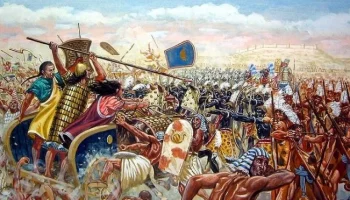We are delighted to introduce three more contributors to the Bible and Violence Project. Today, meet Ericka S. Dunbar, Chingboi Guite Phaipi and Tim Judson (– and find the Baylor connection between two of them!).
But first… the editorial team of The Bible & Violence has finally met in person! Johnathan Jodamus and Mmapula Kebaneilwe joined Shiloh co-directors Chris Greenough and Johanna Stiebert for a public engagement event and conference in Leeds (30 and 31 January 2023). It was fantastic to hatch plans and meet in person (even if it was a trifle chilly outside). But now… back to the contributors…
Ericka Shawndricka Dunbar is Assistant Professor of Hebrew Bible/Old Testament at Baylor University (USA). Her research focuses on biblical texts in relation to topics of gender, ethnicity, violence, intersectional oppression, sexual(ized) abuse, colonialism, trauma, and diaspora. Her first book, Trafficking Hadassah: Collective Trauma, Cultural Memory, and Identity in the Book of Esther and the African Diaspora (Routledge, 2021) is based on her doctoral dissertation and is a dialogical cultural study of sexual trafficking in the book of Esther and during the Transatlantic Slave Trade. In this project, Dr. Dunbar analyses how ethnicity, gender, class, sexuality, and colonialism intersect and interact in instances of human trafficking both in ancient and contemporary contexts. Dr. Dunbar will be writing the chapter on The Bible, Trafficking, and Enslavement.
Enslavement, trafficking, and exploitation of the vulnerable are deeply rooted in large expanses of human history. From ancient to contemporary times, sacred texts and historical narratives and artifacts reflect practices of enslavement and trafficking of marginalized individuals and communities. I will illustrate that depictions of trafficking and enslavement in the Bible are often normalized and rarely contested by biblical writers and biblical interpreters alike. Moreover, many biblical stories frame trafficking and enslavement as reliant upon and as perpetuating kyriarchal and patriarchal ideologies, values, and practices.

Drawing on biblical texts, I intend to (a) use contemporary definitions of (human and sexual) trafficking and enslavement to analyse practices depicted in biblical texts; (b) challenge ancient and contemporary rape cultures and other structural inequities that lead to widespread violence and oppression; (c) reflect upon physical, psychological, and spiritual implications of trafficking and enslavement; and (d) urge readers and interpreters to continue resisting and transforming exploitative, violent and oppressive systems.
________________________________________________________________________________________
Chingboi Guite Phaipi comes from a tribal Christian community in Northeast India that converted en masse a century ago, the result of Western missionaries’ efforts. Chingboi has taught Old Testament at McCormick Theological Seminary and also serves as a Ministers Team member at the First Baptist Church of Chicago. She has published two monographs, Rebuilding a Post-exilic Community: The Golah Community and the “Other” in the Book of Ezra (Pickwick/Wipf and Stock, 2019) and The Bible and Patriarchy in Traditional Patriarchal Society: Re-reading the Bible’s Creation Stories (T&T Clark, January 2023), as well as articles, including “The First Encounter of the Golah and Their ‘Adversaries’ (Ezra 4:1–5): Who Are the Adversaries, and on What Is the Adversity Based?” (Journal of Hebrew Scriptures 20, 2020), “Sending Away Foreign Wives in Ezra 9–10: With a Brief Reflection from a Minority Tribal Perspective” (Asia Journal of Theology 35.1, 2021), and “The Bible and Women’s Subordination: A Tribal Woman Re-reads Genesis 2–3” (International Journal of Asian Christianity 5.1, 2022). For this project, Chingboi will be writing a chapter on The Bible and Violence with Perspectives of Tribal Communities of India.

The Bible is a deeply ingrained part of the identities of the Northeast Indian hill tribes and our traditional tribal cultures share some similarities with biblical Israel’s cultures, as I observe in my latest monograph, The Bible and Patriarchy in Traditional Patriarchal Society.
I argue in my earlier monograph, Rebuilding a Post-exilic Community (2019), that it was the strong self-perception of the exile returnees that impelled them to come up with the stringent measure of sending away “foreign” wives (Ezra 9–10) whom they came to perceive as the “other”. This was unjust. But sometimes, in our culture, too, even standards that are unjust are uncritically and irresponsibly upheld as biblical and Christian.
Reflecting more deeply on our tribal Christian societies, it has become clearer to me that the Bible has been used violently, and that is partly connected with our confident self-perception of being “right” Christians and biblical. In my chapter for this volume, I will explore further the violent employment of the Bible in tribal Christian societies.
In tribal Christian societies (such as Northeast Indian tribes), violence may never be associated with the Bible. Indeed, no physical violence may be carried out in the name of the Bible or Christianity. But when observed carefully, non-physical violent use of the Bible abounds in tribal Christian societies—through both its religious doctrines/rules and its societal and cultural customary laws, mores, and unscripted gestures—that rob some community members of their dignity and fullness of life. In fact, such usages of the Bible are perhaps as or more tragic and deadly than physical violence.
Tim Judson is Lecturer in Ministerial Formation at Regent’s Park College, University of Oxford (UK), where he specialises in systematic theology. He is also an ordained minister in The Baptist Union of Great Britain and serves as pastor of a church in Devon. Tim is contributing a chapter on Dietrich Bonhoeffer’s Christological appropriation of the vengeance psalms as they pertain to Christ’s call to love our enemies. The German theologian and pastor offers rich material for thinking seriously about the call to discipleship in a world where the church can be easily co-opted to serve violent agendas.
Tim’s doctoral thesis explored the place and meaning of lament using Bonhoeffer as his main interlocutor. His monograph Awake in Gethsemane: Bonhoeffer and the Witness of Christian Lament (Baylor University Press, to be published in 2023) examines the theological, ethical and liturgical premise, as well as the obstacles, for faithful lament in the Christian community today. Something that Tim has been keen to do is to explore in more depth how Jesus’ teaching in the Sermon on the Mount sits alongside Bonhoeffer’s stress on praying the whole Psalter.

In my chapter I will present a summary of Bonhoeffer’s historical and theological context, which is necessary for understanding the problems he is attempting to redress in his own work. I will then offer an overview of Bonhoeffer’s famous book, Discipleship (or The Cost of Discipleship), which includes an exposition of the Sermon on the Mount. An analysis of how Bonhoeffer navigates the “love your enemies” passages will frame an optic for then exploring the vengeance psalms, also known as the imprecatory psalms. Bonhoeffer offers a compelling, and disturbingly real hermeneutic for interpreting and appropriating these psalms as a form of faithful participation in the prayers and redemptive suffering of Christ. Finally, the chapter will suggest some challenges and opportunities for using Bonhoeffer’s method as it relates to situations of violence, abuse, and trauma.






